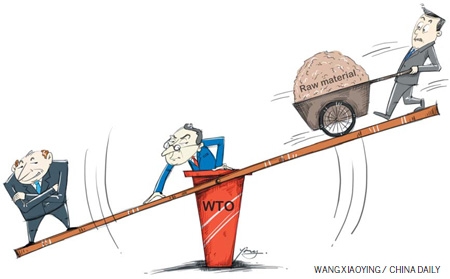|
 |
The World Trade Organization (WTO) released a report recently that says China's export restrictions on nine raw materials - alumina, fluorite, manganese, metallic silicon, carborundum, yellow phosphorus, zinc, coke and magnesium - are inconsistent with WTO regulations. This indicates that China has lost the first round of the battle with the United States and the European Union on export restrictions on raw materials.
If China does not appeal within 60 days of its release, the report would be adopted as arbitration, according to WTO rules. China is certain to appeal, but it has to provide convincing evidence to challenge the WTO contention to get the report partly revised or overthrown.
But China also needs to be prepared for a loss, because the report reflects the views of many WTO experts. Besides, in its biennial report, released last year, evaluating China's trade policy, the WTO criticized China for its export restriction policy on raw materials.
The WTO's unfair and subjective criticism of China's trade policy, however, exposes the insufficient representation of developing countries in the WTO, International Monetary Fund and other international economic organizations, especially because it is difficult for such organizations to understand developing nations' problems.
Instead of targeting China for its export restrictions, the WTO should criticize the three iron ore companies that have been manipulating the market, as well as its own defects. But any change in the WTO will be a slow process.
China now needs to levy higher taxes on the high energy-consuming and high-polluting sectors to reduce the output of natural resources, so that even if it has to loosen its export restrictions on raw materials, the quantity exported would not increase dramatically because of weaker productivity.
Export restrictions, however, remain the most effective way for China to reduce energy consumption and better protect the environment, for such raw materials are mostly in great demand abroad. The rest of the world has to realize that China cannot go on sacrificing its environment for the benefit of other countries.